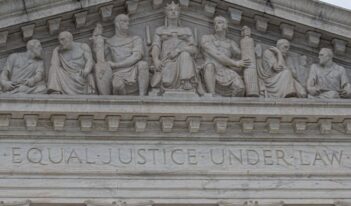
A religious freedom law invoked by conservative groups may also protect progressive causes.
Two religious groups seek the protection of the same neutral-sounding federal law on religious freedom. The first, a Christian church in Philadelphia, protests harsh immigration laws and shelters undocumented immigrants from deportation orders. The second, a Catholic organization that cares for the elderly in Philadelphia and beyond, opposes a federal mandate that requires most employers to provide employees with contraceptive health care coverage.
Both groups claim that a key religious freedom law should exempt their actions from the normal operation of federal policies. But does the federal Religious Freedom and Restoration Act (RFRA) actually protect both groups’ causes equally? So far, federal courts’ application of RFRA appears to favor conservative religious causes, such as corporate exemptions from contraceptive coverage, over more progressive ones, such as pro-immigrant advocacy.
But RFRA’s origins and statutory language give no indication that it should be construed in this way. Passed in 1993 by President Bill Clinton, RFRA states that a person or group can be exempt from any federal law, policy, or action that substantially burdens their religious exercise, unless the government can show that compliance is necessary to further a compelling government interest.
Framed as a “civil rights bill for religious belief,” RFRA responded to a U.S. Supreme Court decision that denied Native Americans unemployment benefits after they were fired for using a hallucinogenic drug in their religious practices. RFRA received nearly unanimous bipartisan support. Although the Court later held RFRA to be unconstitutional if it were to be applied to state policies, many U.S. states proceeded to pass “mini-RFRA” laws that applied a similar standard to local regulations.
Despite its broad language and influence, RFRA seems to have been used most effectively by conservative Christian groups seeking exemptions from laws intended to protect reproductive health and LGBTQ+ civil rights. In the 2014 case Burwell v. Hobby Lobby, the Supreme Court held that RFRA allows a business to deny employees health insurance for contraceptives on religious grounds, in spite of the Affordable Care Act’s requirements. And in a recent dissent to Bostock v. Clayton County, Justice Samuel Alito described RFRA as a “super statute” that may displace the use of federal employment laws to protect gay and transgender workers.
Based on these decisions and others, legal scholars have expressed concerns that the federal judiciary treats RFRA claims by progressive activists and non-Christian groups differently from claims brought by conservative evangelicals. For example, when several groups brought lawsuits on RFRA grounds to challenge President Donald J. Trump’s executive order barring immigration from certain Muslim-majority countries, the Court chose to ignore these claims and upheld the ban in the 2018 case Trump v. Hawaii.
But some recent RFRA claims brought in defense of pro-immigrant activists are not being ignored—and instead may eventually provide a vehicle for expanding RFRA’s applicability.
As deportations of undocumented immigrants increased dramatically over the last four years, some religious communities formed a new sanctuary movement that shields immigrants from U.S. Immigration and Customs Enforcement officers and provides immigrants with assistance as they cross the U.S.-Mexican border.
The new sanctuary movement has used RFRA to defend its advocacy. In November 2019, a federal jury decided that RFRA protected a humanitarian volunteer’s right to provide migrants near the border with water, food, and other aid as a matter of conscience. Professor Katherine Franke of Columbia Law School marked this as the first time a federal judge has “positively analyzed” an RFRA claim in favor of a progressive defendant.
In February 2020, a court tossed out convictions of four other activists, who had been found guilty of violating federal rules by leaving jugs of water and cans of beans at the border. The activists were part of No More Deaths, a Unitarian Universalist ministry that aids immigrants.
These new pro-immigrant victories under RFRA deviate sharply from courts’ treatment of the last major U.S. sanctuary movement, which peaked prior to RFRA’s passage. In the 1980s, faith groups in the Southwestern United States organized to aid refugees fleeing from violence in Central America. At first, churches tried to assist lawfully; churchgoers raised funds and mortgaged their homes to pay for refugees’ bail and legal counsel. But the agency in charge of adjudicating asylum claims rejected all of the 1,400 El Salvadorans and Guatemalans who applied from 1980 to 1982, and asylum grant rates remained very low in the following years.
Some churches reacted by providing physical sanctuary to refugees, in violation of deportation orders. In response, federal law enforcement infiltrated churches with informants, wiretapped Bible study sessions, and charged over sixty sanctuary workers under antiharboring laws. Faith groups argued that sheltering migrants was protected under the First Amendment, but courts rejected the claim that law enforcement imposed a “substantial burden” on their religious practice and emphasized the government’s “compelling interest” in applying immigration laws.
These pre-RFRA immigration cases emphasize the continuing importance of clarifying how courts assess a “substantial burden” on religious exercise. One argument is that the Court has failed to define this standard—creating room for conservative causes to be favored under RFRA over progressive causes, without adequate explanation. A potential solution is for the Court to adopt the “substantial burden” inquiry that is already used by many federal courts of appeals. This standard asks how much a legal requirement burdens a claimant’s religious practice based on the claimant’s own account of their beliefs, rather than the court’s perception.
RFRA’s protection may help progressive religious groups in their quest to protect immigrant families, but future refinements to RFRA’s application may also alter courts’ ability to apply its protections to claims brought by conservative groups. A pending bill, known as the Do No Harm Act, would block RFRA claims against laws that protect Americans against civil rights discrimination, provide access to health care, and target child exploitation, for example. The bill seeks to restore RFRA to its original, bipartisan-endorsed purpose: to provide a “protective shield for religious minorities.”



